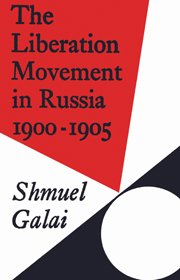Book contents
- Frontmatter
- Contents
- Dedication
- Acknowledgments
- Note on dates, etc.
- List of abbreviations
- Introduction
- Part One ORIGINS
- Part Two THE FORMATION OF THE LIBERATION MOVEMENT
- 5 The launching of the Liberation Movement
- 6 The organization of public opinion
- 7 The intelligentsia in ascendency
- 8 The formation of the Union of Liberation
- Part Three WAR AND REVOLUTION
- Appendix A The origins of Beseda
- Appendix B A bibliographical note on the writings of Kuskova and Prokopovich in the years 1898–9
- Appendix C Note on sources on the formation of the Liberation Movement
- Bibliography
- Index
6 - The organization of public opinion
Published online by Cambridge University Press: 22 September 2009
- Frontmatter
- Contents
- Dedication
- Acknowledgments
- Note on dates, etc.
- List of abbreviations
- Introduction
- Part One ORIGINS
- Part Two THE FORMATION OF THE LIBERATION MOVEMENT
- 5 The launching of the Liberation Movement
- 6 The organization of public opinion
- 7 The intelligentsia in ascendency
- 8 The formation of the Union of Liberation
- Part Three WAR AND REVOLUTION
- Appendix A The origins of Beseda
- Appendix B A bibliographical note on the writings of Kuskova and Prokopovich in the years 1898–9
- Appendix C Note on sources on the formation of the Liberation Movement
- Bibliography
- Index
Summary
The founding-fathers of the Liberation Movement regarded public opinion as their chief weapon in their struggle against autocracy. Since the suppression of the Writers Union in March 1901 had left the zemstvos as the only public institutions in which a public opinion campaign could be launched, the project was entrusted to the zemstvo radicals. The foundation of Beseda and its growing domination by the constitutionalists from the beginning of 1901 created a very convenient instrument for the fulfilment of this task. Thus it was through Beseda that the zemstvo radicals began to organize the public opinion campaign in the zemstvo milieu.
The first plenary meeting of Beseda after the tumultuous events of February–March 1901 was apparently held in June of that year. Its moderate members, and the liberal Slavophiles especially, must have regarded these events with grave concern, since they provided additional proof, if such was still needed, that unless the government could be induced to grant extensive concessions in the very near future, the situation might deteriorate into a full–scale revolutionary upheaval. In the prevailing mood of the meeting it cannot have been very difficult for the zemstvo radicals to spur the circle to immediate action. It was apparently on their initiative that Beseda concluded its June meeting by sending a circular letter to many zemstvo activists urging them to raise general political questions at the forthcoming (winter 1901–2) session of the provincial zemstvo assemblies. This circular subsequently became known as the ‘Letter from the Veteran Zemstvo Members’.
- Type
- Chapter
- Information
- The Liberation Movement in Russia 1900–1905 , pp. 133 - 156Publisher: Cambridge University PressPrint publication year: 1973



